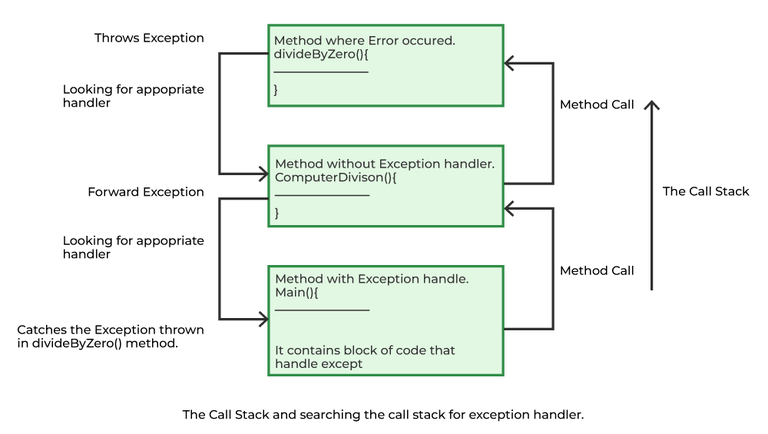How Does JVM Handle an Exception?
Default Exception Handling:
Whenever inside a method, if an exception has occurred, the method creates an Object known as an Exception Object and hands it off to the run-time system(JVM). The exception object contains the name and description of the exception and the current state of the program where the exception has occurred. Creating the Exception Object and handling it in the run-time system is called throwing an Exception. There might be a list of the methods that had been called to get to the method where an exception occurred. This ordered list of methods is called Call Stack. Now the following procedure will happen.
- The run-time system searches the call stack to find the method that contains a block of code that can handle the occurred exception. The block of the code is called an Exception handler.
- The run-time system starts searching from the method in which the exception occurred and proceeds through the call stack in the reverse order in which methods were called.
- If it finds an appropriate handler, then it passes the occurred exception to it. An appropriate handler means the type of exception object thrown matches the type of exception object it can handle.
- If the run-time system searches all the methods on the call stack and couldn’t have found the appropriate handler, then the run-time system handover the Exception Object to the default exception handler, which is part of the run-time system. This handler prints the exception information in the following format and terminates the program abnormally.
Exception in thread "xxx" Name of Exception : Description
... ...... .. // Call StackLook at the below diagram to understand the flow of the call stack.

// Java Program to Demonstrate How Exception Is Thrown
// Class
// ThrowsExecp
class Test {
// Main driver method
public static void main(String args[])
{
// Taking an empty string
String str = null;
// Getting length of a string
System.out.println(str.length());
}
}Output: Exception in thread "main" java.lang.NullPointerException: Cannot invoke "String.length()" because "str" is null
at find_missing_number.MultipleMissingNumber.main// Java Program to Demonstrate Exception is Thrown
// How the runTime System Searches Call-Stack
// to Find Appropriate Exception Handler
// Class
// ExceptionThrown
class Test {
// Method 1
// It throws the Exception(ArithmeticException).
// Appropriate Exception handler is not found
// within this method.
static int divideByZero(int a, int b)
{
// this statement will cause ArithmeticException
// (/by zero)
int i = a / b;
return i;
}
// The runTime System searches the appropriate
// Exception handler in method also but couldn't have
// found. So looking forward on the call stack
static int computeDivision(int a, int b)
{
int res = 0;
// Try block to check for exceptions
try {
res = divideByZero(a, b);
}
// Catch block to handle NumberFormatException
// exception Doesn't matches with
// ArithmeticException
catch (NumberFormatException ex) {
// Display message when exception occurs
System.out.println(
"NumberFormatException is occurred");
}
return res;
}
// Method 2
// Found appropriate Exception handler.
// i.e. matching catch block.
public static void main(String args[])
{
int a = 1;
int b = 0;
// Try block to check for exceptions
try {
int i = computeDivision(a, b);
}
// Catch block to handle ArithmeticException
// exceptions
catch (ArithmeticException ex) {
// getMessage() will print description
// of exception(here / by zero)
System.out.println(ex.getMessage());
}
}
}Output: / by zero
Post a Comment